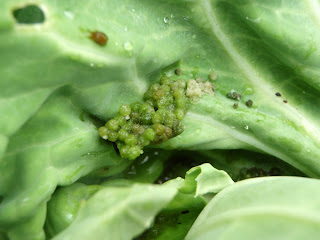I guess I'm doing a little of each, like most organic gardeners probably do - the eventual goal is complete health of not only my vegetables, but also the soil and all the living things that are affected by what I do in my garden.
 The infamous corn flea beetle on the tomatoes. Numbers aren't bad enough to do any real damage, with plants at 3' already. These guys can mow down entire stands of young transplants overnight when there are enough of them. I'll keep an eye on the damage and worse case (plants start suffering) use neem oil.
The infamous corn flea beetle on the tomatoes. Numbers aren't bad enough to do any real damage, with plants at 3' already. These guys can mow down entire stands of young transplants overnight when there are enough of them. I'll keep an eye on the damage and worse case (plants start suffering) use neem oil. This honeybee OD'ed on pollen.
This honeybee OD'ed on pollen.I didn't have my camera, but I also observed many aphids on my hops. I also saw 5 or 6 lady bugs on each hop plant, feasting away. Also present were red or black ants, who "farm" the aphids by protecting them and keeping them on the plant, where the aphid colonies increase and secrete hondey-dew (aphid crap!), which the ants feed on. Usually I would nuke the aphids with pyrethrin spray, but this also kills ladybugs, so this year I'm gonna let them be and see what happens.
Also lots of spiders out, which eat the good and the bad insects, so don't help or hurt. They are, however, a good indicator that my garden is in good health and that insects of all kinds are thriving there.
Also lots of spiders out, which eat the good and the bad insects, so don't help or hurt. They are, however, a good indicator that my garden is in good health and that insects of all kinds are thriving there.




No comments:
Post a Comment